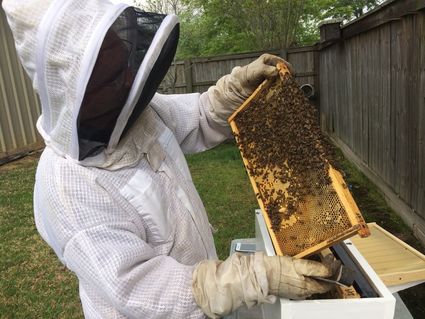Beekeeper finds lessons alive in hive
Last updated 4/4/2017 at Noon
For The Record
After studying honeybees for several years, Len Van Marion might be ready to send a few to Washington.
“Honeybees are amazing little creatures, because they have altruistic behavior. They’re going to do what’s best for the hive,” he said.
“If we could get a few congressmen to feel like that, we’d be in good shape.”
Van Marion lives in that in-between part of Orange County where he’s in the Orangefield water district, the Bridge City school district and his mailing address is Orange.
But his home is a spring wonderland of blooming trees and plants for this ExxonMobil retiree to enjoy with his family – and his bees.
“I started with one hive because I have blueberries in the back and I just wanted my bees to pollinate them,” he said.
Eight years later, he owns more than 50 hives, each one home to as many as 50,000 bees.
“I don’t do near as much fishing as I thought I’d do, and I don’t do near as much golfing as I thought I’d do,” Van Marion said of his retirement years.
He and wife D’Juana volunteer with 4H Club through the Texas A&M AgriLife Extension Service.
But he stays busy with his bees. Caring for them and teaching others.
“When our grandkids started school, I bought a demonstration hive and gave talks to their classes. Now I speak at garden clubs, anywhere I’m invited to speak,” he said.
“We managed to get an Orange County Beekeepers group started. It seems to be doing well. I’m really proud of that.”
The first meeting of the Orange County Beekeepers had nine or 10 in attendance. Within months, club meetings quadrupled in attendance.
The group meets on the first Tuesday of each month at La Cantina Restaurant, 2907 MacArthur Drive, in Orange.
Chris Moore, past president of the Texas Beekeepers Association, will be guest speaker May 2 meeting.
“Most of the folks who are involved with it just want a beehive or two in their backyard to pollinate their cucumbers,” Van Marion said. “A lot of people that come to the meetings don’t have any bees. They may get a hive in the future.”
Brian Muldrow of Beaumont, a professional beekeeper who operates Muldrow Bee Farm, helped Van Marion learn about bees.
“He was doing recoveries and I went with him. I got interested in doing recoveries,” Van Marion said.
Bee recoveries are also known as bee removals. When homeowners find beehives in their walls, attics or backyard trees, they reach out for help from beekeepers. Van Marion answers those calls.
“Every time you go to a house to remove a hive, you never know what you’re going to find. To me, the challenge is removing the hive, helping the homeowner get the bees away, because they are afraid of them,” Van Marion said.
A honeybee will forage an area of 10,000 to 12,000 acres for nectar and pollen, visiting as many as 1,000 flowers a day, Van Marion said.
The lifespan of a honeybee is six weeks. The bee spends the first three weeks in the hive, building honeycomb and guarding the queens. It spends its final three weeks foraging for nectar, pollen and water.
Drones die after mating with a queen.
According to Van Marion, a queen will mate with about 15 drones a week after she hatches and keep producing eggs for two to three years.
“Some queens can live four or five years,” Van Marion said, “But we’re seeing less and less of that, because of all the insecticides in things now.
“We’re losing 30 percent to 40 percent of our hives in the U.S. every year. The only thing keeping the honeybees population is beekeepers’ ability to split the hives.”
Meanwhile, Van Marion learns from the bees and passes it on.
“A honeybee knows if he stings somebody, he’s going to die. Unless a honeybee believes he’s protecting that hive, he’s not going to sting you,” the beekeeper said.
“And the worker bee has given up its ability to reproduce [through evolution]. The honeybee will raise a queen or drone it’s not even kin to. They will accept a larvae from another hive, because they know the hive needs a queen and they’ll give up their on genetic line to raise a new queen because it’s best for that hive.”
The selflessness impresses Van Marion.
“They’re amazing little creatures,” he said. “The more I get involved with them, they never cease to amaze me. It seems like there’s always something else to learn.”
















Reader Comments(0)